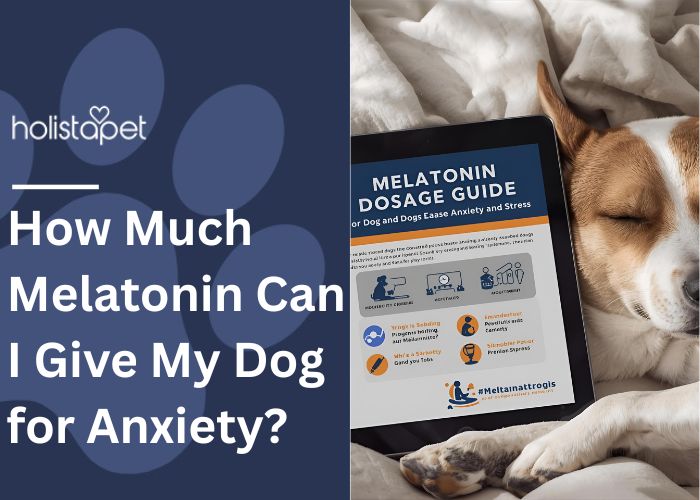Is melatonin toxic to dogs? It's a fair question, since many people turn to melatonin products for better sleep themselves. For our canine friends, it can help with rest and anxious behaviors, but only at the right dosage.
Pet parents need to know that while melatonin is usually safe, mistakes with amounts or type given can cause discomfort. Always talk with your vet before getting your pooch started on this sleep aid.
What is Melatonin?

Melatonin is a naturally occurring hormone made by the pineal gland in the brain that helps regulate sleep-wake cycles. It signals when it's time to rest, making it useful for sleep-related issues or anxious behaviors.
Dog-specific melatonin supplements are available, and veterinarians prescribe them for certain cases. They're generally well-tolerated when given at the correct dose based on a dog's weight and health.
How Melatonin Works in the Canine Body
Melatonin in dogs comes from the pineal gland, a small part of the brain that regulates sleep cycles. As daylight fades, melatonin levels rise and tell the body it's time to rest. This rhythm helps pups fall asleep and stay asleep.
Dog-specific melatonin products copy this natural process. They support canines with sleep problems, anxious behaviors, and even those with seasonal hair loss. When given in the correct dose, they can help balance the body and calm the mind.
Is Melatonin Safe or Toxic for Dogs?
Melatonin is generally safe for dogs when given in appropriate doses. Do note that too much melatonin can cause unwanted effects. The correct amount depends on size, weight, and overall health. Guidance from a professional is always recommended.
Safe Dosages of Melatonin for Dogs
The right melatonin dosage for dogs depends on their weight, health, and specific needs. Most guidelines recommend starting at the lowest safe amount and adjusting only if advised by a veterinarian. In general:
- Small dogs (<10 lbs): 1 mg
- Medium dogs (10–25 lbs): 1.5–3 mg
- Large dogs (26–100 lbs): 3–6 mg
Melatonin is typically given once or twice daily, but it should never be dosed without veterinary guidance. Pet owners should avoid guessing amounts, since too much can cause grogginess, digestive upset, or other side effects. Always confirm with a vet before giving melatonin to your dog.
Signs of Too Much Melatonin in Dogs
Too much melatonin can upset a dog's body and lead to unwanted effects. Pet parents should watch closely for:
- Excessive Sleepiness. Your dog seems overly tired or struggles to stay awake.
- Upset Stomach. Queasiness, stomach troubles, or loss of appetite may appear.
- Confusion or Agitation. Odd behaviors, restlessness, or worried thoughts can develop.
- Increased Heart Rate. Fast heartbeat or unusual panting may occur.
Benefits of Melatonin for Dogs
Melatonin offers several benefits for dogs, especially when sleep issues or anxiety problems show up. Let's discuss these advantages in the next sections:
- Reducing Uneasiness and Distress
- Supporting Better Sleep and Rest Cycles
- Helping With Phobias (Fireworks, Thunderstorms, Travel)
- Managing Cushing's Disease and Other Health Concerns
Reducing Uneasiness and Distress
Dog-specific melatonin can help calm anxious behaviors that appear during stressful times. Many owners notice a soothing effect that helps their pets relax. This calming impact makes melatonin useful during loud noises or other distressing events.
The hormone works with the body to help ease worried thoughts and agitation. When given in the correct dosage, melatonin supports a more balanced mood without relying on heavy medications.
Supporting Better Sleep and Rest Cycles
Melatonin regulates sleep patterns by signaling the body when it's time to rest. Dogs with sleep disorders or uneven sleep-wake cycles may benefit from this natural support. Owners often notice their dogs fall asleep faster and stay asleep longer.
Vets also prescribe melatonin to help older dogs or those with cognitive issues. With proper guidance, these supplements can restore better rest patterns in struggling pups.
Helping With Phobias (Fireworks, Thunderstorms, Travel)
Loud noises like fireworks or thunderstorms can trigger fear in our canine friends. Melatonin supplements may bring a calming effect during these moments, helping them feel safer. Travel stress can also be easier to handle with the right dosage.
By lowering agitation, melatonin supports your dog's comfort in tough situations. Many veterinarians recommend it for anxious behaviors tied to specific phobias or stressful events.
Managing Cushing's Disease and Other Health Concerns
Veterinarians sometimes prescribe melatonin for dogs with Cushing's disease. This condition involves excessive cortisol production. Melatonin supplementation can support balance in such cases. It may also help manage seasonal flank alopecia by supporting the growth of hair follicles.
Beyond these uses, dog melatonin supplements may also assist with cognitive issues and certain sleep problems. Always ask a veterinarian about appropriate doses for these health concerns.
Risks and Side Effects of Melatonin in Dogs
Melatonin is generally fine for dogs, but side effects can appear if the dosage is too high. Some sensitive pups may also show mild reactions even at recommended dosages. Possible unpleasant effects include stomach troubles, sleepiness, or mood changes. If your furry buddy shows unusual signs, contact your vet immediately for guidance.
Potential Mild Side Effects
Some dogs may experience mild reactions after taking melatonin. These effects are usually short-term but still worth noting. Keep an eye out for:
- Sleepiness. Your dog may appear drowsy or less active than normal.
- Stomach Troubles. Queasiness, upset stomach, or minor digestive problems can come up.
- Restlessness. Some pups may act unsettled or show anxious behaviors.
- Increased Heart Rate. Faster heartbeat or panting may occur in sensitive canines.
When Giving Your Dog Melatonin Becomes Unsafe
Giving melatonin becomes unsafe when the dosage is too high or when it mixes with other medications. Too much melatonin can lead to unwanted effects that upset the body. Human supplements with sugar substitutes like xylitol also pose serious risks. Pet parents should avoid guessing dosages and always follow veterinary guidelines for safe use.
Dogs That Should Avoid Melatonin
Not every dog should take melatonin supplements. Puppies under a year old may react differently. Pregnant or nursing dogs should also avoid melatonin. Canines with autoimmune disorders, blood pressure problems, or diabetes may also face risks.
If your pet takes other medications, melatonin supplementation may not be ideal. Always ask your vet for advice before giving melatonin to your pup, especially if they have any ongoing health concerns.
HolistaPet's Melatonin Soft Chews for Dogs – A Calming Treat You Can Trust

HolistaPet's Melatonin Soft Chews give your pup a natural way to relax. Each piece blends melatonin with calming ingredients like chamomile, valerian root, and L-theanine. These tasty treats help reduce anxious behaviors and support better sleep.
Made with all-natural, cruelty-free, and gluten-free ingredients, each bag includes 30 chews your dog will love. Pet parents can trust these yummy bites to keep their furry friends calm, cool, and collected.
Beyond Dog Melatonin Supplements: Other Ways To Help Your Pup Relax
Melatonin is not the only option for calming dogs. Pet parents can support their furry friends with a mix of natural routines and lifestyle adjustments. Gentle remedies, daily exercise, and training can all bring a calming effect. Together, these approaches help pups handle stress while boosting overall comfort and rest.
Nutritional Support & Natural Remedies
A balanced diet can improve your dog's mood and rest. Foods rich in nutrients support steady energy and fewer anxious behaviors. Some natural remedies, like chamomile or CBD wellness products, may also help. Pro tip: HolistaPet has soothing CBD pet products in treat, chew, oil, and capsule forms.
These options give owners gentle alternatives alongside dog melatonin supplements. Always check with a veterinarian before adding new products or remedies to your dog's wellness routine.
Training & Enrichment for a Balanced Mindset
Mental exercise can calm a dog as much as physical activity. Training sessions, puzzle toys, and playtime keep the mind active and reduce worried thoughts. Dogs that stay busy often show fewer anxious behaviors.
Positive reinforcement builds confidence and trust. With steady routines and enrichment, your furry friend buddy can handle stressors better while enjoying a happier, balanced mindset.
FAQs About Melatonin and Dogs
Pet owners often ask questions about dog melatonin supplements before trying them. Common concerns focus on safety, dosage, and how fast it works. These answers can guide you in making informed choices.
Is melatonin toxic to dogs in large amounts?
Yes, too much melatonin can be harmful for dogs. Large amounts may cause discomfort, confusion, or stomach troubles. Always follow the recommended dosage for your pup and call your veterinarian immediately if you suspect an overdose.
Can I give my dog human melatonin supplements?
Human melatonin supplements are not always safe for dogs. Some contain artificial sweeteners like xylitol, which can be toxic to our canine companions. Only give your pup melatonin approved or recommended by a vet.
How long does it take for melatonin to work in dogs?
Melatonin usually starts working within 15 to 30 minutes. Effects may last several hours, depending on your dog's size and health. Always give melatonin under veterinary guidance for best results.
How often can I give my dog melatonin?
The frequency depends on your dog's weight, health, and sleep issues. Veterinarians often suggest giving melatonin once or twice daily, but instructions vary. Never adjust the dosage without professional advice.
Final Thoughts on Melatonin for Dogs
Melatonin can support pups with sleep problems, phobias, or anxious behaviors when given in the correct dosage. While generally safe, too much of it may cause side effects, so professional guidance is important.
For pet owners seeking a trusted option, HolistaPet's Melatonin Soft Chews provide a natural way to keep dogs relaxed and well-rested. With safe ingredients and calming benefits, they're a treat you and your furry bestie can count on.


 CBD Oil for Dogs - Fast Acting
CBD Oil for Dogs - Fast Acting
 Chicken Flavored CBD Oil For Dogs - Easy Dose
Chicken Flavored CBD Oil For Dogs - Easy Dose
 Salmon Flavored CBD Oil For Dogs - Highly Rated
Salmon Flavored CBD Oil For Dogs - Highly Rated
 CBG Oil for Dogs and Cats - Loved by Thousands
CBG Oil for Dogs and Cats - Loved by Thousands





Leave a comment
All comments are moderated before being published.
This site is protected by hCaptcha and the hCaptcha Privacy Policy and Terms of Service apply.